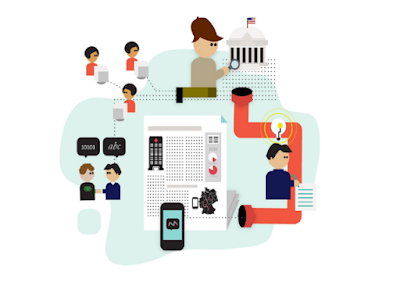Opportunities and challenges of data journalism in Ghana
The practice of Data journalism is changing the face of news production in Ghana's media landscape. Data journalism is a set of skills for searching, understanding and visualizing digital sources in a time that basic skills from traditional journalism just aren't enough. It’s not a replacement of traditional journalism but in addition to improving journalism.
Data journalism is the use of data and numbers in journalism to uncover, better explain and/or provide context to a complex news story. In a time where sources go digital, journalists can and have to be closer to those sources. The Internet has opened up possibilities beyond our current understanding. Data journalism is just the beginning of evolving our past practices to adapt to the use of data in storytelling.
Data journalism serves two important purposes for news organizations: finding unique stories and execute your watchdog function. Especially in times of financial peril, these are important goals for media organizations to achieve. The unifying goal is a journalistic one: providing information and analysis to help inform the public about important issues of the day.
Is data journalism the future?
A critical view of the media landscape worldwide clearly shows that data journalism is the future. Having access to data allows journalists to go the extra mile in news production. More than anything else, data journalism provides truth and clarity in the increasing amount of digital information that exists in the world today. Journalists need to be technologically savvy.
It used to be that you would get news content by interviewing people but now it’s also about poring over data and equipping yourself with the tools to analyze it and picking out what will give clarity and helping people out about what’s going on in the country.
Data journalism has helped to see things you might not otherwise see and understand. Some news contents can only be understood and explained through analyzing and sometimes visualizing the data available. When information was scarce, most of our efforts were devoted to hunting and gathering.
Now that information is abundant, processing is more important. We process at two levels: (1) analysis to bring sense and structure out of the never-ending flow of data and (2) presentation to get what’s important and relevant into the consumer’s head. Like science, data journalism discloses its methods and presents its findings in a way that can be verified by replication.
Challenges of Data Journalism in Ghana
Data journalism is no longer the novelty it was a few years ago for the majority of media around the world. Including in emerging countries, the value of data journalism is widely recognised. However, a model of practice is yet to be established.
Clearly, data journalism is at an early stage in emerging countries. In Ghana, a big challenge to data journalism is the access to open data. In countries like Sweden and Norway, the laws for access to data are friendlier than in Ghana and other African countries. Journalists should be able to search for fundamental data and not have to settle for verifying statistics coming from the mouth of a politician. Fact-checking is concerned with verifying and contesting official data.
Another challenge is that data visualization tools are not keeping up with the pace of innovation. As a result, journalists are building their own solutions: Ninety per cent of data journalists in Ghana use in-house tools and software, whether it’s data visualization tools or even data cleaning solutions.
Despite these challenges, data journalism in 2018 has become more mainstream than at any other time in the history of Ghana's journalism.
These days, to stay competitive, it is not enough for journalists to simply report what is happening. Using data analyses allows journalists to gain deeper insights into events and draw connections that are not simply visible to the members of the general public (Lorenz and Welle, n.d.). In addition, data adds authority to stories that would otherwise appear as mere anecdotes (Hackett, 2013). Data can act as evidence to claims and turn abstract phenomenon into something people can understand and relate to (Lorenz and Welle, n.d.).
Source: Ghana| Charles Kwasi Marfo | Luv 99.5 FM/Nhyira 104.5 FM




Comments